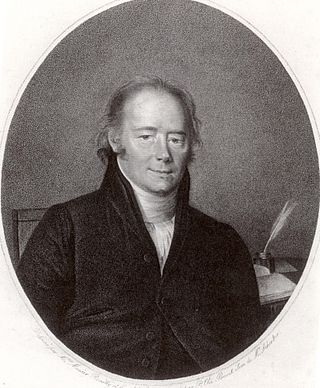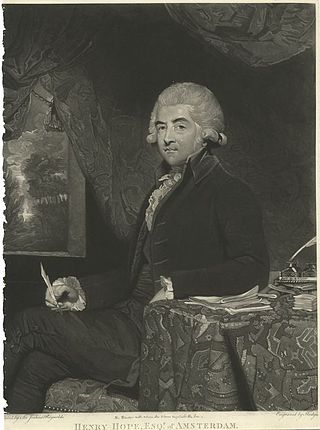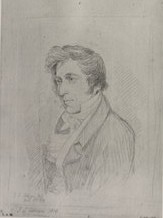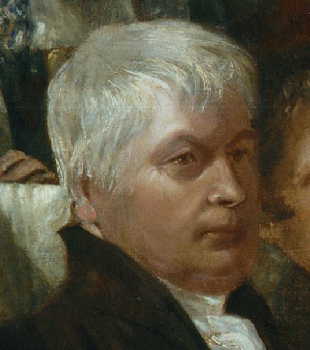Related Research Articles

William Tuke, an English tradesman, philanthropist and Quaker, earned fame for promoting more humane custody and care for people with mental disorders, using what he called gentler methods that came to be known as moral treatment. He played a big part in founding The Retreat at Lamel Hill, York, for treating mental-health needs. He and his wife Esther Maud backed strict adherence to Quaker principles. He was an abolitionist, a patron of the Bible Society, and an opponent of the East India Company's inhumane practices.

William Allen was an English scientist and philanthropist who opposed slavery and engaged in schemes of social and penal improvement in early 19th-century England.

Moses Brown was an American abolitionist and industrialist from New England who funded the design and construction of some of the first factories for spinning machines during the American industrial revolution, including the Slater Mill which was the first modern factory in America.
The Peace Society, International Peace Society or London Peace Society, originally known as the Society for the Promotion of Permanent and Universal Peace, was a pioneering British pacifist organisation that was active from 1816 until the 1930s.

Henry Hope (1735–1811) was an Amsterdam merchant banker born in Braintree, Province of Massachusetts Bay. He emigrated to the Netherlands to join the family business Hope & Co. at a young age. From 1779, Henry became the manager of Hope & Co. and he participated in the firm for about a third from 1782. He is considered to be as great a genius as his uncle Thomas Hope. In 1786 Adam Smith dedicated the fourth edition of his book The Wealth of Nations to Henry Hope in hopes of increasing his readership:

Hope & Co. was a Dutch bank that existed for two and a half centuries. The bank was located in Amsterdam until 1795; originally it concentrated on Great Britain. From 1750 it played a major part in the finances of the Dutch East India Company (VOC) through Thomas Hope and his brother Adrian. During the Seven Years' War (1756–1763) the Hope brothers profited from the Netherlands' neutral position and became very wealthy. The Hopes became heavily involved in the Dutch Caribbean, and Danish West Indies. They specialised in plantation loans, in which the entire produce of the plantation was remitted to the lender, who would supervise its sale in order to secure repayment. In this way, the Hopes helped the plantation economy to become integrated into a global network of financiers and consumers. The Hope family were among the richest in Europe at the time. The family business focused on financing commercial transactions and especially on issuing money loans to monarchs and governments in Denmark, Sweden, Poland, Russia, Portugal, Spain, France and America. The bank was famous for having Catherine the Great as their client and Adrian supplied her several times with diamonds.

Joseph Woods was an English Quaker architect, botanist and geologist born in the village of Stoke Newington, a few miles north of the City of London. A Member of the Society of Antiquaries, and an Honorary Member of the Society of British Architects, he was also elected a Fellow of the Linnean Society and a Fellow of the Geological Society in recognition of his original research.

Samuel Gurney was an English banker and philanthropist from the Gurney family of Norwich. He should not be confused with his second son, Samuel (1816–1882), also described as banker and philanthropist, and a Member of Parliament.

Samuel Hoare Jr was a wealthy British Quaker banker and abolitionist born in Stoke Newington, then to the north of London in the county of Middlesex. From 1790, he lived at Heath House on Hampstead Heath. He was one of the twelve founding members of the Society for the Abolition of the Slave Trade.

The British credit crisis of 1772–1773 also known as the crisis of 1772, or the panic of 1772, was a peacetime financial crisis which originated in London and then spread to Scotland and the Dutch Republic. It has been described as the first modern banking crisis faced by the Bank of England. New colonies, as Adam Smith observed, had an insatiable demand for capital. Accompanying the more tangible evidence of wealth creation was a rapid expansion of credit and banking, leading to a rash of speculation and dubious financial innovation. In today’s language, they bought shares on margin.

Daniel Beale (1759–1842) was a Scottish merchant and fur trader active in the Far East mercantile centres of Bombay, Canton and Macau as well as at one time the Prussian consul in China.

Louisa Gurney Hoare was an English diarist and writer on education, and a member of the Gurney family. She was concerned particularly with standards of education.

Thomas Parke was a Liverpool slave trader, merchant, banker and privateer. He was part of the complex network of business interests and finance behind the African and Atlantic slave trade of the later 18th century.

David Barclay of Youngsbury (1729–1809), also known as David Barclay of Walthamstow or David Barclay of Walthamstow and Youngsbury, was an English Quaker merchant, banker, and philanthropist. He is notable for an experiment in "gratuitous manumission", in which he freed an estate of Jamaican slaves, and arranged for better futures for them in Pennsylvania. His legacy was as one of the founders of the present-day Barclays Bank, a century ahead of its formation under that name, and in the brewing industry.
The Gurneys were an influential family of English Quakers, who had a major part in the development of Norwich, England. They established Gurney's Bank in 1770, which merged into Barclays Bank in 1896. A number of family members were abolitionists. Members of the family still live in the United Kingdom.
Andrew Todd was an Ulster merchant and fur trader at Montreal and Louisiana. Born into a wealthy family at Coleraine, County Londonderry, he was the son of Daniel Todd (1735–1783) of Randalstown, County Antrim, and his wife Letitia Thornton, sister of Lt.-General Sir William Thornton. He came to North America to work in the trading firm of his uncle, Isaac Todd, who was the business partner of James McGill at Montreal. He became a junior partner of the firm and in 1791 was admitted as a member of the Beaver Club. In 1794, the Spanish Governor, Francisco Luis Héctor de Carondelet, granted him an exclusive monopoly over all the trade in Louisiana; highly sought after particularly by Canadians as it was then still separate to the United States. This gave him the exclusive right to the valuable trade on the Upper Mississippi River, the Missouri River and the area north of Ohio. He jealously defended his position and soon became known in the region as "Don Andreas", successfully sending vast stores of goods up from New Orleans while bringing back furs. His uncle's firm back in Montreal, Todd, McGill & Co., had found itself in a position to then monopolize the supply of the entire Mississippi Valley, but the declaration of war between Spain and Britain in October 1796, followed by Andrew's death at New Orleans later that year, dashed their expectations. At his decease, Andrew Todd was unmarried and left no children. By his will, he released his slave, Jack, and left his entire estate to his uncle, Isaac, except for $500 that he left to James McGill, the other executor of his will.
Rivington, or Rivington's, also called Rivington & Co., was a London-based publishing company founded by Charles Rivington (1688–1742), originally from Derbyshire, and continued by his sons and grandsons.

Heath House is a historic mansion on Hampstead Heath. It is Grade II* listed and located on Hampstead's North End Way in the London Borough of Camden. It is located at the highest point upon leaving the capital, about four miles north of Trafalgar Square. The Hampstead War Memorial stands in front of the house.
John Gurney Hoare was an English cricketer with amateur status, and later a banker.
Jeremiah Harman was chief of a family known in the commercial world for nearly a century, and highly esteemed both in England and abroad. He may himself be said to have stood at the head of London city, both as to mercantile and private character; liberal in his dealings, and inspiring confidence by his honor and integrity, as well as love for his personal qualities. As a public character Mr. Harman was known to all the ministers of the day, from William Pitt Jr downwards.
References
- ↑ Puritan family of Wilmer: their alliances and connections
- ↑ Jennings, Judith (November 12, 2013). The Business of Abolishing the British Slave Trade, 1783-1807. Routledge. ISBN 9781317791874 – via Google Books.
- 1 2 3 "The Gentleman's Magazine (London, England)". F. Jefferies. May 13, 1844 – via Google Books.
- 1 2 Evans, David Morier (May 13, 1849). "The Commercial Crisis, 1847-1848: Being Facts and Figures Illustrative of the Events of that Important Period Considered in Relation to the Three Epochs of the Railway Mania, the Food and Money Panic and the French Revolution. To which is Added an Appendix..." Letts, Son and Steer – via Google Books.
- 1 2 "The City of London and slavery: evidence from the first dock companies, 1795–1800" (PDF). Archived from the original (PDF) on 2015-05-18. Retrieved 2015-05-06.
- ↑ Fox, George (May 13, 1925). "The Short Journal and Itinerary Journals of George Fox". CUP Archive – via Google Books.
- ↑ "The Gentleman's Magazine, Volume 81, Part 1; Volume 109". 1811.
- 1 2 3 4 5 6 7 8 9 10 11 12 13 Dunn, Richard S.; Dunn, Mary Maples (29 September 2015). The World of William Penn. University of Pennsylvania Press. p. 374. ISBN 978-1-5128-0196-5.
- ↑ A History of Higham House
- ↑ Jennings, Judith (November 12, 2013). The Business of Abolishing the British Slave Trade, 1783-1807. Routledge. ISBN 9781317791874 – via Google Books.
- ↑ "Journal of the Cork Historical and Archaeological Society". Cork Historical and Archaeological Society. May 13, 1892 – via Google Books.
- ↑ History of the Wilmer family, together with some account of its descendants
- ↑ "The New Complete Guide to All Persons who Have Any Trade Or Concern with the City of London, and Parts Adjacent". Longman,Rivingtonand sons. May 13, 1783 – via Google Books.
- ↑ "Browse - London Lives". www.londonlives.org.
- ↑ "Catalogue description Insured: John Harman, Jonathan Hoare and Jeremiah Harman, Fredericks Place, the Old..." July 6, 1792 – via National Archive of the UK.
- ↑ Borrow, George (May 13, 1825). "Celebrated Trials and Remarkable Cases of Criminal Jurisprudence from the Earliest Records to the Year 1825". Knight and Lacey – via Google Books.